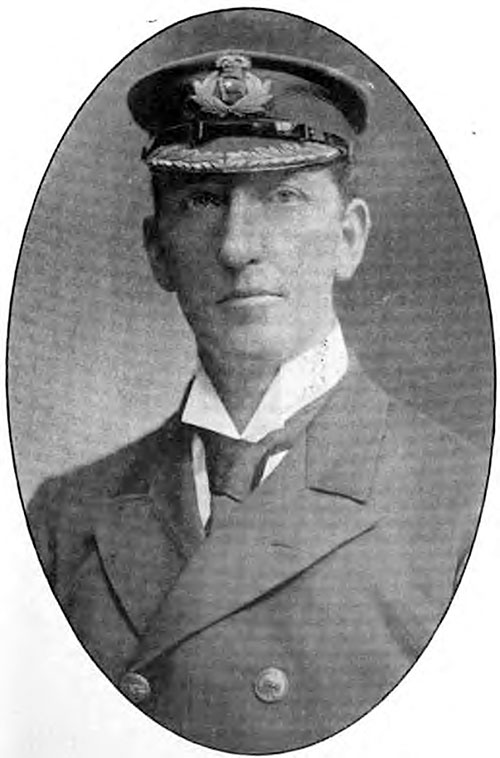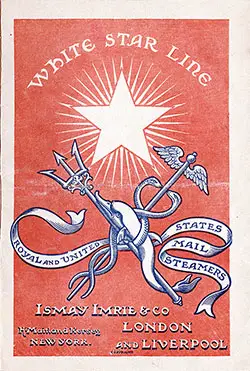Captain E. R. McKinstry, R.N.R.

Captain Edward R. McKinstry of the White Star Line. The Nautical Magazine: A Technical and Critical Journal for the Officers of the Mercantile Marien, The Ryal Naval Reserve, and Yachtsmen. Vol. LXXIV, No. 9, September 1905, p. 839. GGA Image ID # 12e83950d5
There is generally a good deal of similarity in the early training of commanders of Atlantic ferry-boats. But in the case of Captain E. R. McKinstry, R.N.R., we have a slight variation.
His first experience was obtained on the training-ship Conway. Here he spent two years. On leaving the Conway he received an appointment as midshipman in the Royal Naval Reserve, " which," says Captain McKinstry, " means being twenty-eight days every year with the mess on the Eagle gunnery-ship."
Edward R. McKinstry, R.N.R. to Assume New Role
The duties of Captain Kendall’s office will shortly be assumed by Captain Edward R. McKinstry, R.N.R., who has relinquished command of the White Star Royal Mail steamer Teutonic to enter his new sphere.
The City of Dublin Steam-packet Company has made no mistake in their choice; a safer one it would be difficult to find. Captain McKinstry has made phenomenal progress in his profession, has been the recipient of many marks of recognition and admiration and, withal, has always retained an unvarying kindliness of disposition with a keen eye for what is right and what is wrong. With a marked aversion to fuss and ostentation, he has extensive knowledge of maritime affairs and a comprehensive and searching way of carrying out the significant responsibilities which fall on his shoulders.
He is one of those more frequent productions of modern days which are a commentary on the idea which was once quite common, that noise and bounce were characteristics indispensable to a thorough seaman, and inseparable from the due and proper performance of ships’ duties.
The Nautical Magazine extends its hearty congratulations to Captain McKinstry on the excellent position which he has now attained. Passing his early schooldays at Finchley, he served as a cadet for two years onboard the Conway, where he showed great promise and left her in possession of what was then known as the “Star Double Extra Certificate.”
He made his debut to the sea as an apprentice on board the British Merchant, under the command of Captain Molony and owned by the British Shipowners’ Company. So soon as young McKinstry had put in the qualifying time, the Board of Trade certificates were his next consideration. Second Mate, First Mate, and Extra Master Was-to use a cricketing colloquialism—-“the order of going in.”
Before obtaining the “Extra” certificate, he was Chief Officer of the SS Dunluce which was engaged in transporting during the Egyptian campaign. His start in “liners” was made in the Pacific Steam Navigation Company but when Fourth Officer of the Valparaiso disaster overtook him, for she ran ashore on the coast of South America and became a total wreck.
Though he had nothing whatever to do with the catastrophe, Mr. McKinstry on arrival home “sought fresh fields and pastures new ” and betook him to the White Star Line where he was at once given a Junior Officer’s position.
The fate of the Valparaiso proved to the fourth officer McKinstry a blessing in disguise for, on joining the White Star, he progressed with remarkable rapidity. Curiously enough, it was when as a fourth officer of the ship, he eventually commanded that he early distinguished himself.
The Teutonic was the most excellent specimen of merchant marine architecture lying at Spithead at the time of the great Naval Review in Jubilee year.
The late head of the White Star Line, Mr. T. H. Ismay, was entertaining a large party of distinguished guests on board, and one who visited her was the then Prince of Wales, our present King. It so happened that a naval training-brig sailed by and, from some cause or another, a naval instructor was knocked overboard.
Mr. McKinstry, witnessing the instructor’s danger, instantly jumped into the rescue, and after some difficulty succeeded in rescuing his man. The praises he received were many, and in addition to other forms of recognition, the White Star Line presented him with a gold watch and chain as a mark of their admiration of his gallant deed.
Another act of bravery, perhaps even more conspicuous in its way, was that where Mr. McKinstry when he was the second officer of the Ionic, on the high seas, jumped from that vessel—when proceeding at full speed—to the rescue of a lunatic passenger.
This also he carried out, and the passengers on the Ionic displayed their admiration of such an act by presenting him with a service of plate and a cheque for fifty pounds.
This does not complete his record, for, on one occasion in New York, when coming from the church he jumped into the river to save a drowning boy and his mission was again successful. The nature of the deed is to be gauged by the fact that, at the time, the thermometer was below zero, and the river was full of ice.
It is almost superfluous to say that a very few years found him, in the first place, commanding one of the cargo boats of the line. From thence he was promoted to the passenger steamer Germanic —now the Ottawa of the Dominion Line—and after some years in this vessel he, on the retirement of Captain Henry Presell, R.N.R., was appointed commander of the Teutonic, one of the “crack” White Star boats, and a very favorite vessel with transatlantic voyagers.
Captain McKinstry is a son of the late Colonel McKinstry of the Argyll and Sutherland Highlanders, and he has a brother holding similar rank in the Army at the Present Time. We are indebted to one of our contributors for his photo, which is an excellent likeness.
A Few of the Voyages Commanded by Captain E. R. McKinstry

1896-07-22 RMS Germanic Passenger List
- Steamship Line: White Star Line
- Class of Passengers: Saloon
- Date of Departure: 22 July 1896
- Route: Liverpool to New York via Cobh (Queenstown)
- Commander: Captain E. R. McKinstry, R.N.R.

1903-02-04 SS Teutonic Passenger List
- Steamship Line: White Star Line
- Class of Passengers: Saloon
- Date of Departure: 4 February 1903
- Route: New York to Liverpool
- Commander: Captain E. R. McKinstry
After leaving the Conway, McKinstry served four years in the service of the British Shipowners' Company of Liverpool, during which time he enlarged his general practical knowledge of navigation and of the world. His subsequent experience is summed up in his own words, as follows :—
" After that 1 passed the Board of Trade examination as second mate. Then I went as second mate of a ship for fourteen months, and at the end of that time passed as first mate. After acting as first mate for something over a year, I passed as master. Having taken that grade, I entered the service of the Pacific Navigation Steamship Company as fourth officer. "
"I was in that service for about a year and a half, and then was given an appointment as fourth officer by the White Star. This was in 1887. Gradually I worked my way up as vacancies occurred from fourth to third, from third to second, and from second to chief officer, and so to master. I was in the company's New Zealand service for nearly four years. I then succeeded to the Teutonic as chief officer."
Most persons who take an interest in the Navy will recollect the review at Spithead in the month of August, 1889, in which the Teutonic took part, and was naturally the observed of all observers, first and foremost amongst whom were the German Emperor and the Prince of Wales, who paid a visit to the new "mercantile cruiser," and greatly admired her fine proportions and her appropriate and very characteristic armament.
On the occasion of this visit an incident took place which showed First Officer McKinstry to be possessed of one of the best qualities of a seaman, "gallantry and humanity," as it is described on the medals of the Board of Trade.
The training-ship Exmouth had put in an appearance at the review, and having approached very near to the Teutonic on the lee side, she found that the towering sides of the latter took her wind. This caused her boom to go over, and one of her quartermasters being in the way he was knocked into the sea.
McKinstry, hearing the cry of " Man overboard," immediately jumped from the deck of the Teutonic and went to the man's assistance. The moment, it may be well imagined, was one of intense excitement, hundreds of persons, who were waiting for the arrival of the Kaiser and the Prince of Wales, being witnesses of the accident and the rescue. Nor is this the only instance of the kind in Captain McKinstry's career.
On another occasion, when returning from church one Sunday morning while in New York, he heard the cry that there was a child in the water. In an instant his coat and hat were thrown off and he was in the water, and quickly brought the little one to land.
My informant—for it must not he supposed that the hero of these rescues told me of them himself---in relating this incident remarked, with a curious malapropos, "
The water was so filthy that neither you nor I would go into it for any money."
But to proceed with Captain McKinstry's experience. From the Teutonic he went to the Adriatic as commander in December, 1892. "Since that time," says the captain, "
I have commanded the Runic one voyage; the Britannic two voyages, and the Adriatic five voyages, while this ship —the Germanic- - was being re-engined. The rest of the time I have been in the Germanic. I now hold a lieutenant's commission in the Royal Naval Reserve, and I have an extra-master's certificate.
This is above the master's certificate, and the examination for it is quite voluntary. Since 1887 I have made one voyage to New Zealand in the Ionic. All the rest of the time I have been running between Liverpool and New York.
We have the very worst weather that is to be had between here and New York. I never saw a worse sea than the one we experienced on the South Coast of Ireland the last time we came over."
In all my talks with captains of Atlantic liners, as well as with others, I have of late taken some pains to obtain their opinion on the British sailor question, for it is a "question," and bids fair ere long to become a very burning one.
So I asked Captain McKinstry what he thought of the British seaman and of seafaring generally as a profession. Briefly stated, his reply was that on the White Star ships British sailors were chiefly employed.
" We may occasionally have a foreigner among the crew, but rarely more than one or maybe two. For myself, I prefer the Britisher."
I made the remark that in some quarters there was a preference for the foreigner, because, as some said, he was less troublesome. The reply I got was :--
"It is true an English seaman may be troublesome; but so may a Scandinavian, and if the Scandinavian is a troublesome one, he is generally very troublesome indeed. No, I prefer the Britisher all the time."
As to the general question, Captain McKinstry said :-
" If a boy is manly, plucky, and intelligent, the sea offers him a fair opportunity. There are plenty of chances of promotion. My father there "—he pointed to the photograph of a handsome military officer that hangs in his cabin—" thought all his sons ought to go into the Service, and I have two brothers in it; but I would not exchange positions with either of them."
